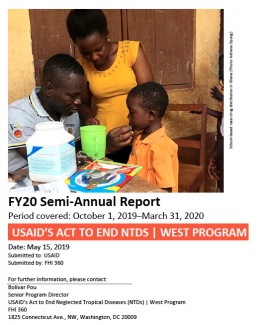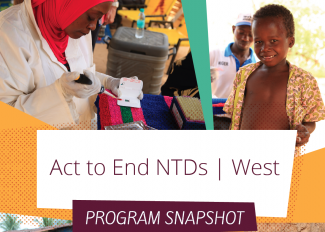To understand the challenges, opportunities, and recommendations for maximizing continuity of disease control during public health emergencies, we sought perspectives from Nigeria and Guinea on the process of restarting NTD control efforts during the COVID-19 pandemic.
Resources
Effect of preventive chemotherapy with praziquantel on SCH among school age children in sub-Saharan Africa: a spatiotemporal modelling study
Christos Kokaliaris, Amadou Garba, Martin Matuska, Rachel N Bronzan, Daniel G Colley, Ameyo M Dorkenoo, Uwem F Ekpo, Fiona M Fleming, Michael D French, Achille Kabore, Jean B Mbonigaba, Nicholas Midzi, Pauline N M Mwinzi, Eliézer K N'Goran, Maria Rebollo Polo, Moussa Sacko, Louis-Albert Tchuem Tchuenté, Edridah M Tukahebwa, Pitchouna A Uvon, Guojing Yang, Lisa Wiesner, Yaobi Zhang, Jürg Utzinger, Penelope Vounatsou,
Effect of preventive chemotherapy with praziquantel on schistosomiasis among school-aged children in sub-Saharan Africa: a spatiotemporal modelling study, The Lancet Infectious Diseases, 2021, ISSN 1473-3099,
https://doi.org/10.1016/S1473-3099(21)00090-6.
Restarting Neglected Tropical Diseases Programs in West Africa during the COVID-19 Pandemic: Lessons Learned and Best Practices
In line with the WHO recommendations and guidance issued in April 2020, USAID advised Act | West to temporarily suspend NTD field activities.

FY20 Semi-Annual Report: October 2019—March 2020
This report outlines the key achievements and challenges in the first six months of the second year of implementation of USAID's Act to End NTDs | West Program, spanning the period October 1, 2019–March 31, 2020.

Act to End NTDs | West Aperçu du Programme
Cette brochure résume le travail de la loi de l'USAID pour mettre fin aux MTN | Programme Ouest, qui donne une vue d’ensemble des activités du programme et des progrès accomplis à ce jour alors que nous continuons à prendre des mesures pour perturber les dommages causés par les maladies débilitantes de la pauvreté. Construit sur la base d'une large coopération internationale et mis en œuvre par un consortium solide de partenaires profondément engagés, dirigé par FHI 360, Act | West travaille en étroite collaboration avec les gouvernements de 11 pays africains pour éliminer et contrôler à long terme cinq des MTN les plus courantes au monde.

Act to End NTDs | West Program Snapshot
This brochure summarizes the work of USAID's Act to End NTDs | West Program, providing a big picture look at program activities and progress to date as we continue taking action to disrupt the damage of debilitating diseases of poverty. Built on a foundation of broad international cooperation and implemented by a strong consortium of deeply committed partners, led by FHI 360, Act | West works closely with the governments of 11 African countries to eliminate and control five of the world’s most common NTDs over the long term.
Risk factors associated with failing pre-transmission assessment surveys (pre-TAS) in lymphatic filariasis elimination programs: Results of a multi-country analysis
This paper reports for the first time factors associated with pre-transmission assessment survey (pre-TAS) results from a multi-country analysis. This information can help countries more effectively forecast program activities, such as the potential need for more rounds of mass drug administration, and prioritize resources to ensure adequate coverage of all persons in areas at highest risk of failing pre-TAS.

Striving for gender equity in the fight against neglected tropical diseases
It’s no secret that men and women don’t always have equal access to health services, so USAID’s NTD Programs recently studied gender balance in mass drug administration for NTDs.